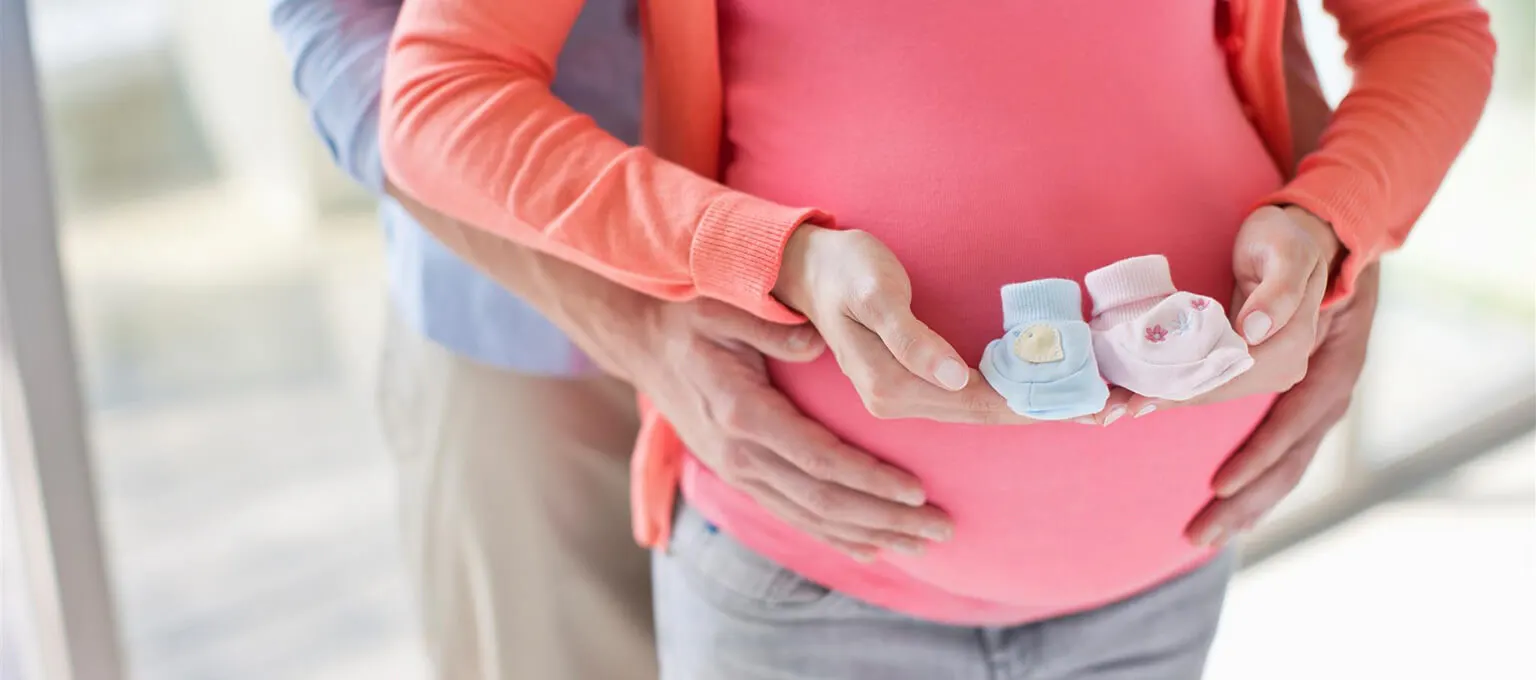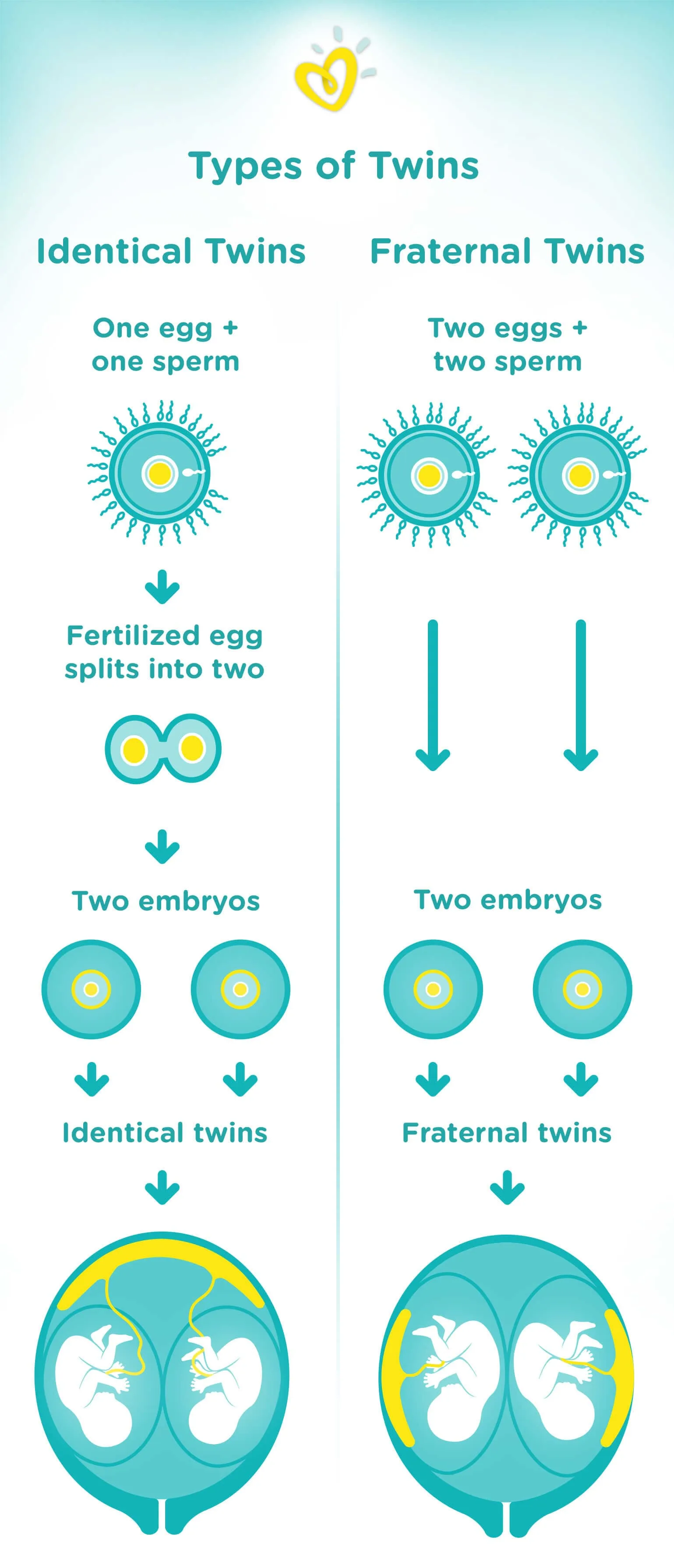FAQ: Twin Pregnancy
Got more than one baby on the way? Congratulations, you’re one of a select group of mums-to-be who are expecting twins or more! You probably have lots of questions about your twin pregnancy, including whether there are any special symptoms, what the difference between identical and non-identical twins are, and what you can do to prepare for the arrival of your babies. In this article we’ll answer your top twin pregnancy questions, so let’s jump right in…
How Did I Become Pregnant With Twins?
There are two ways this can happen. Identical twins are conceived when one fertilised egg splits into two. Experts aren’t sure what causes identical twins – in fact, every mum-to-be has the same chance of carrying identical twins – that’s 1 in 250.
Non-identical twins happen when 2 separate eggs are fertilised and both implant into the uterus. These factors could increase your chance of non-identical twins:
If you conceived via in vitro fertilization (IVF) – about one in five babies pregnancies conceived via IVF are multiples.
A family history of twins on the mother’s side
If you or your partner are from certain ethnic backgrounds, such as Nigerian
Being an older mum-to-be – as you age you are more likely to release more than one egg at ovulation.
Sometimes there may be no obvious reason, especially with identical twins. It could be all down to your good luck! If you’ve just found out you’re expecting twins, you might be feeling a little shocked. Keep in mind that although having twins will require you to be extra organised, the reward is double the fun. Plus, you’re certainly not alone. In the UK, 1 in every 65 births are of twins, triplets, or even more!
When Will I Find Out If I’m Having Twins?
Most of the time, your midwife or doctor will be able to tell you at your dating scan at 8 to 14 weeks. Once your twin pregnancy is confirmed, your midwife or doctor may recommend more antenatal care visits, extra monitoring and additional scans to make sure you and your babies are healthy.
What Are the Symptoms of a Twin Pregnancy?
Although you may share many of the same symptoms as mums-to-be carrying a single baby, when pregnant with twins, you are more likely to experience:
Increased weight gain. One of the signs of a twin pregnancy is gaining more weight than expected for your week of pregnancy. If you’re unsure about what weight gain is right for you, your midwife can help. Because of this extra weight gain, you might find that your pregnancy starts to show a little earlier if you’re carrying twins.
Itchy skin. As your skin stretches over your growing belly, you might notice symptoms like itching earlier in your pregnancy.
Piles and varicose veins. Due to the extra weight of your babies pressing against the blood vessels in your pelvic area, you may experience these sore, enlarged blood vessels around your pelvic region.
Backache and pelvic pain. As your pregnancy progresses and as the weight of your babies increases, you may experience this kind of pain more often. Practicing good posture, resting regularly, wearing comfortable shoes and avoiding lifting heavy objects can help relieve some of this pain. Your doctor will also be able to suggest ways to relieve the discomfort.
Heartburn and indigestion. This might be caused by extra pressure on your stomach as you womb presses against it. Eat smaller, more frequent meals, don’t eat for a few hours before going to bed, and avoid any foods you know trigger your heartburn or indigestion.
You may have heard you will suffer with more morning sickness, luckily, this is not necessarily true.
What’s the Difference Between Identical and Non-Identical Twins?
Identical twins happen when the fertilised egg splits in two very early on in the pregnancy, eventually forming as two embryos. If you’re having identical twins, your babies will have the same genes and will be the same sex and look very similar with the same eye colour, hair colour and blood type. Roughly one-third of all twins are identical.
Non-identical twins happen when two eggs are released and both are fertilised. If you’re having non-identical twins your babies will be genetically similar in the same way siblings are. Non-identical twins can be the same sex or a boy and a girl. About two-thirds of all twins are non-identical.
You may find out if your babies are identical or non-identical during pregnancy or right after they are born. Your midwife or doctor will check for signs like whether there is only one placenta – this is a sign they are definitely identical. If it can’t be confirmed, a DNA test will be required. This DNA test is not covered by the NHS.
What Are the Risks for Me and My Babies?
You shouldn't worry unduly – most twin pregnancies result in the birth of two happy and healthy babies and your doctor and midwife are taking good care of you all. Still, it's good to know about some of the risks and potential complications, which can include:
Premature birth. More than half of all multiples births are premature. Premature labour is going into labour before 37 weeks, so your little gang might arrive earlier than your due date. If this happens, your doctor will be able to walk you through the extra care your preemies might need.
Low birth weight. Each baby tends to be born smaller, with a low birth weight of under 2.5 kg (5.1 pounds). Your doctor will be able to explain what – if any – extra care your babies need to support their growth and development.
Twin-twin transfusion syndrome. This condition can affect some identical twins who share the one placenta. With this syndrome, there's an imbalance in blood flow and one baby gets too much blood volume while the other doesn't get enough. Your doctor will regularly assess the health of your babies to make sure everything is OK.
Cord entanglement. One percent of identical twins share both the inner (amnion) and outer membrane (chorion), and a placenta. If your twins are in this 1 percent, your little ones will require more frequent monitoring by your doctor as there is a higher risk of one of your babies becoming entangled in an umbilical cord.
When carrying twins or multiples, you are also at a greater risk of certain pregnancy complications, including:
Anaemia. Symptoms of iron deficiency including fatigue, shortness of breath, heart palpitations and pale skin. If you think you may have anaemia, talk to your doctor, as a simple blood test will be able to confirm it. Your doctor may prescribe iron supplements if necessary.
Pre-eclampsia. This is a high blood pressure disorder which can become serious if not monitored and treated. Your doctor will check your blood pressure at your routine prenatal appointments.
Gestational diabetes. You are at greater risk of developing this form of diabetes, which is marked by high blood sugar levels during pregnancy. Your doctor will recommend a glucose tolerance test between 24 and 28 weeks of pregnancy, or sometimes a little earlier. This test helps your doctor diagnose gestational diabetes.
How Much Weight Should I Gain in a Twin Pregnancy?
If you’re pregnant with twins, it’s normal to gain more weight than if you are pregnant with a single, however, how much weight you gain also depends on your starting weight. That’s why your midwife is the best person to ask about your pregnancy weight gain. Overall, it’s important to gain the weight gradually and to stick to a healthy pregnancy diet including lots of
fruit
vegetables
wholegrains
protein such as lean red meat, eggs and nuts
dairy such as milk, cheese and yoghurt.
Don’t forget there are some foods you should not eat when pregnant.
Exercise can also help you achieve healthy weight gain. Just make sure your doctor gives you the green light. Go for low impact exercises like swimming, walking or yoga.
How Do I Prepare for Twins?
In many ways, your preparations will be similar to if you were pregnant with a single baby. For example, you need to look into your maternity leave options and get your hospital bag packed. Still there are some things you will need to do a little differently:
Find the right midwife. Choose a midwife who is experienced with twins. She’ll be able to answer the questions that are relevant to your pregnancy, and offer the appropriate advice and care.
Get the nursery ready early. Your babies may arrive ahead of schedule, so get your home and nursery prepared a little earlier. You’ll also need to stock up on doubles of things like car seats and cribs, and more of things like clothes and diapers. You’ll have your hands full once your babies arrive, so you may want to do some early babyproofing of your home.
Discuss your birth preferences and options with your doctor. You might think that you can’t have a vaginal birth if you’re carrying twins but, in fact, more than 40 percent of twins are born vaginally. The stages of labour [link stages of labour] are pretty much what would happen if you had a single baby, however, your doctor may be more likely to recommend a hospital birth and having an epidural. There may also be more medical staff there with you during labour and delivery. In some cases, your doctor may recommend a caesarean, for example, if the first baby is breech, your twins share a placenta, or because you have had a difficult delivery in a past pregnancy. Discuss your preferences with your doctor keeping in mind that childbirth doesn’t always go to plan so things may change when the time comes.
Take a childbirth class tailored for twins. Ask your midwife whether there is a childbirth class tailored for twin pregnancies in your area. This could be a good way to meet other mums-to-be of twins, too. If you would like to breastfeed, you might also be able to find a lactation class nearby that can help you with things like breastfeeding positions for twins.
Keep costs down. Twins can be expensive. Speak to other mums of twins for recommendations on what you’ll definitely need and what you can easily go without. Although it’s best to buy new cot mattresses and car seats, you can buy things like clothes and toys second-hand or accept hand-me-downs from friends and family.
Ask for help. If loved ones offer to help, consider accepting their offers if you think it really will take some of the load off you. They might be able to help with things like cooking meals, running errands, or looking after your children for a few hours to give you a chance to rest and recharge your batteries.
Is It Normal to Feel Anxious About a Twin Pregnancy?
It’s natural to feel nervous about expecting two or more babies. After all, you’ll have to be prepared, focused and physically fit to take care of more than one newborn at once. Although there’s no doubt taking care of multiples will keep you on your toes, remember the plus side: They’ll keep each other company and you’ll get the wonderful experience of watching them grow into unique little people.
There’s another plus! If you’ve been struggling to narrow down your baby name wish list, having twins means you can choose even more names from your shortlist. Our Baby Name Generator can also help you find the perfect twin names.
It might also help you feel more reassured to read our week by week pregnancy guide. Although some things may be a little different for you, a lot of the information will still be relevant.
FREQUENTLY ASKED QUESTIONS
You’re about to welcome double the joy into your life. Although, you’ll no doubt have much to think about and plan, soon enough, you’ll have not one, but two bubbly little personalities adding happiness to your growing family.
Join Pampers Club and get:






